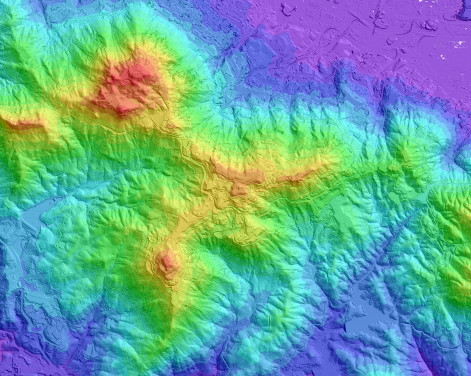Media
HKU Faculty of Science receives a large donation of remote sensing data for environmental research
07 Oct 2019

Below is a DTM (Digital Terrain Model) of Hong Kong Island created using the newly acquired lidar data. The DTM shows the elevation of the ground surface, with all of the buildings and trees removed to reveal the underlying shape of the land. These data show the surface elevation with a vertical accuracy of ~10 cm and a pixel size of 50 cm.
As cities become increasingly complex and dynamic, scientists need creative ways to study geological, ecological and environmental aspects of urban environments. An important modern technique for environmental science is Remote Sensing, which means to study the surface of the Earth using data and images collected by airborne platforms (plane, helicopter or drone) or spaceborne platforms (satellites). Though these types of data provide critical information for scientists, planners and policy makers, remote sensing data are expense to acquire and process, and therefore cutting edge research in Hong Kong is limited in part by available data.
The Faculty of Science, The University of Hong Kong is pleased to announce that it has received a large donation of remote sensing data for Hong Kong and other locations from a local industry partner (DiMap Ltd), with an estimated value of at least HKD 9.3 million. The data include lidar (laser ranging) topographic data and very high resolution aerial photography of much of the SAR, with extremely high spatial resolution, in addition to similar data other parts of the world allowing our scientists to explore for resources and carry out environmental assessments in various settings from Australia to South America.
“The Faculty is very pleased to receive this donation of valuable and unique data. It will be used extensively in both research and teaching. LIDAR is an exceptional technology and allows for details to be captured of vegetation as well as the ground on which it sits. The resolution of the data allows the recreation of tree cover, tree height and the size of tree trunks which allow detail vegetation maps in addition to those of the surface,” said Professor Matthew Evans, Dean of Science and ecologist in School of Biological Sciences.
Lidar data for Hong Kong are an extremely important dataset. The data were acquired by DiMap using a fixed wing aircraft flying at low air speed, allowing them to collect a very high density of laser ranging points. The result is the highest resolution topographic information that is available for such a large fraction of Hong Kong.
The donated lidar data will allow HKU geologists to identify hotspots for further study, map out geological structures and geomorphology of the region, and carry out new studies of bedrock structure and slope stability, as well as environmental studies. Together with studies of minerals at microscopic level, the datasets add additional dimensions to the analysis of our researchers. Such data are invaluable for coastline studies in studying coastal ecology, flood hazards and other topics.
Professor Yongqiang Zong of the Department of Earth Sciences comments “Because the Lidar data can provide accurate, high-resolution elevations of low-lying areas, it is a highly valuable data set for flood risk analysis, relevant to urban planning, coastal engineering works and natural hazard insurance industry. It is therefore highly beneficial to Hong Kong as we are so reliant on land resources of low-lying coastlines.”
One of the ways the Faculty of Science engages in Knowledge Exchange is through collaboration with local industry partners. Dr Joseph Michalski, an Associate Professor in the Department of Earth Sciences, works closely with the Director of Dimap, Dr Holger Eichstaedt, who adds “Dimap’s interest is to be involved in the local geospatial science community to work together on HK problems but also to develop competency and cutting edge solutions in the HK office to apply them in the worldwide projects.” Such relationships help translate fundamental research from the laboratory to applied, real-world solutions.
One of our main goals in the Department of Earth Sciences, and Faculty of Science in general, is to carry out high impact, fundamental research that both unveils mysteries of nature and at the same time improves society.
The University of Hong Kong will host a lidar data processing and application workshop later this autumn. The workshop will be open to any interested professionals from government agencies, private institutions or universities.
Knowledge exchange video on Remote Sensing: https://www.youtube.com/watch?v=LDnohskDBVI
About DiMap: http://www.dimap.asia/
Media enquiries:
For media enquiries, please contact Mr Benjamin Miu, Science Outreach & Liaison Officer, HKU Faculty of Science (tel: 3917 4948; email: benmiu@hku.hk) or Dr Joseph Michalski, Associate Professor of Department of Earth Sciences (email at jmichal@hku.hk).
Video download
Image download: https://www.scifac.hku.hk/press
